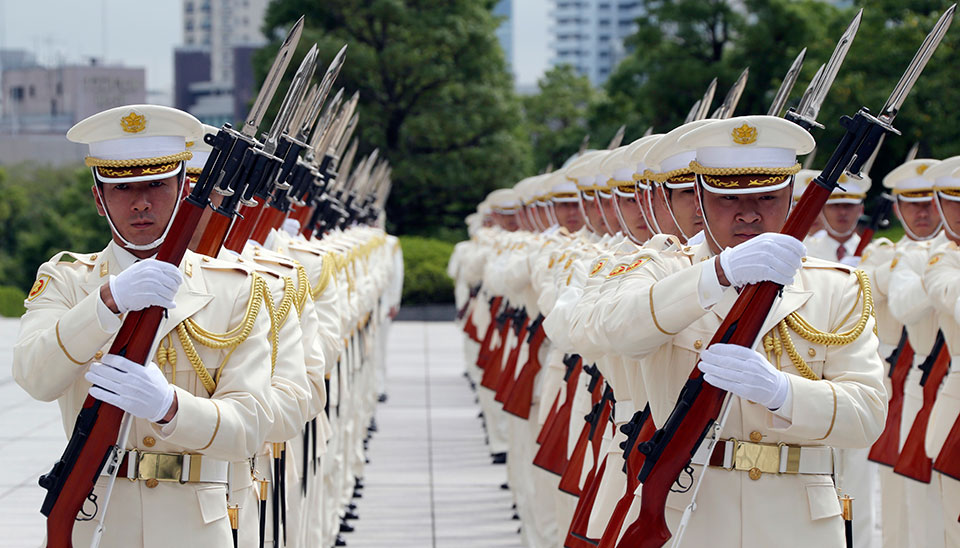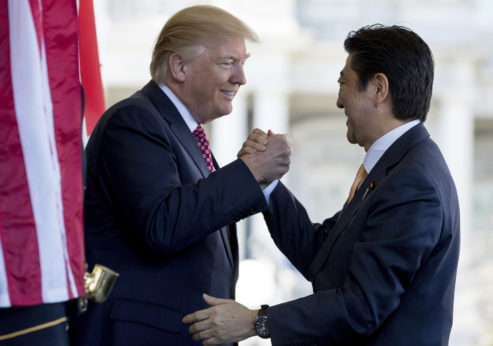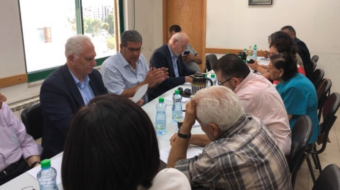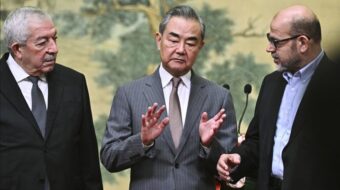
Taking advantage of tensions with North Korea, Japanese Prime Minister Shinzo Abe has announced a plan to bring about constitutional reform by 2020. Two years ago, a law permitting the country to send troops abroad incited the Japanese to take to the streets for months, but the current security situation is changing the political calculus.
Repeated missile launches and nuclear tests by North Korea have created an opening for Abe to advance his military agenda. He announced his intention to revise the Peace Constitution, adopted after Japan’s surrender at the end of World War II, no later than 2020.
Article 9 of the constitution forbids Japan from initiating war, limits the capacity of the country’s armed forces to a defense capacity only, and requires Japan to pursue “international peace based on justice and order.” Abe’s declaration comes during the celebration of sixty years under this basic law.
Last Saturday, Abe, who is a leader of the nationalist and monarchist Nippon Kaigi (Japan Conference) group, attended a ship-launching ceremony for the country’s largest naval vessel, the helicopter carrier JS Izumo. The ship was sent to support the American nuclear-powered aircraft carrier Carl Vinson and its strike force off the coast of the Korean peninsula.
This is the first operation of its kind since the adoption of the 2015 security law permitting Japanese troops to fight abroad in support of its allies. This legislation had incited fierce debates and protests not seen in decades within the archipelago.
Shifts in public opinion
Abe’s new statement concerning constitutional revision confirms above all that he believes in his destiny. And in his re-election.
His main focus is a revision of the war-renouncing Article 9. The prime minister hopes to obtain a specific distinction for Japan Self-Defense Forces (JSDF), so that they no longer appear unconstitutional.
“According to Prime Minister Shinzo Abe, North Korea possesses the ability to hit Japan with a sarin-tipped ballistic missile”, reports public broadcaster NHK. Since North Korea has attempted several missile launches – one of which was aborted over the Sea of Japan – Japanese public opinion has changed with regard to constitutional revision.
According to a poll produced for The Asahi Shimbun, Japan’s leading newspaper, 41 percent of the population would be in favor of altering Article 9. That number could be as high as 48 percent, according to another poll in The Mainichi newspaper. The number was only 26 percent during the debates in 2015.
At that time, constitutional experts had, for the most part, judged the proposed reform to be unconstitutional. As not to rush the parliament, the Prime Minster stated, “While only a national referendum, at the end of the day, can decide if the constitution will be changed or not, only the National Diet [Japanese parliament] can introduce an amendment.”
Pressure from the U.S.
During the current decline in the security situation, Prime Minister Abe would like particularly to realize the nationalist Nippon Kaigi’s long-time dream of repealing the Peace Constitution imposed by occupying American forces after World War II. Conservatives are making the rebuilding of military capacity a question of sovereignty.

This constitutional revision, backed by former U.S. President Barack Obama when he was in office, could potentially involve Japan in American wars. “Without Article 9, Japanese leaders would not have been able to say ’no’ to the war in Iraq,” pointed out the constitutional expert Higuchi Yoichi in the Japan Times.
Today, Donald Trump continues to repeat the hope that U.S. allies in the Asia-Pacific region will do their part in the financing of their defense. These assertions, which created heightened tensions with countries in the region, added to the American president’s desire to pull out of the Trans-Pacific Partnership.
At their first meeting at the White House in February, Donald Trump and Shinzo Abe commended the strength of the ties between the two countries. Shortly after returning to Japan, Abe announced his intention to increase the country’s military spending. The latest effort to revise Article 9 follows in the same path.
This article originally appeared in L’Humanite. It was translated into English by Tyler Gates.












Comments